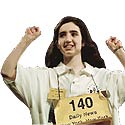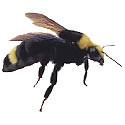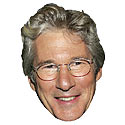1. Spelling bees remain entirely under the radar until ESPN televises part of the 67th Annual Scripps Howard National Spelling Bee live in 1994. (Though Dan Quayle does his part two years earlier with his “potatoe” classroom gaffe.) The broadcast runs an hour longer than expected thanks to a sudden-death overtime. Participants object to endless pauses for commercials and cross-promotion: The winner of the Disney-sponsored contest is meant to jump up and say, “I’m going to D-I-S-N-E-Y!,” but in his excitement, he forgets.

2. Brooklynite Rebecca Sealfon, the first home-schooler to win the national bee, gives an eerily ecstatic performance, shouting the winning letters in euonym to take home the 1997 title. The clip makes it onto local-news highlight reels across the country, hinting that spelling might not be an entirely soporific sport.
3. Inspired in part by Sealfon’s victory, Myla Goldberg writes the novel Bee Season. In the book, published in 2000, an eccentric 9-year-old unexpectedly ascends the bee heights with the help of her Jewish-scholar father—and becomes obsessed with Kabbalistic numerology. The epigraph is a quote from Rebecca Sealfon: “Are you really proud of me?” Delighted reviewers embrace Goldberg.
4. Spellbound, a documentary by Jeffrey Blitz, is released in 2002. The incisive film follows eight very intense children, ages 10 to 14, spelling their way to the nationals, along with their widely diverse families. It’s nominated for the Best Documentary Oscar. Blitz tells reporters, “As Americans, we love clutch players—those athletes who rise to the challenge.” Sports Illustrated announces that “spelling has arrived.”

5. That same year, a New York improv group called the Farm performs a sketch called “C-R-E-P-U-S-C-U-L-E.” It features fiercely competitive and very odd bee participants in a small suburban county. Though it’s staged only briefly, one of the actors, Sarah Saltzberg, happens to be a nanny for Wendy Wasserstein—who goes to see it and is quite impressed.
6. Seeing something in the idea, Wasserstein suggests to a friend, Falsettos composer and lyricist William Finn, that he take spelling bees to the next level. Finn hooks up with “C-R-E-P-U-S-C-U-L-E” creator Rebecca Feldman and brings on playwright Rachel Sheinkin, his former student at NYU, to craft a full-scale plot and an ending. The show retains some audience participation, and gains emotive musical numbers (“My Friend the Dictionary”).

7. After a triumphant Massachusetts tryout, the musical opens at Second Stage with James Lapine directing. Meanwhile, a movie made from Bee Season is slated for release late this year, with a script by movie matriarch Naomi Foner Gyllenhaal. Richard Gere will star as the Kabbalist father, Juliette Binoche as his obsessive-compulsive lawyer wife, and the young Flora Cross as the now-archetypal beleaguered preteen nerd.
See John Simon’s Review of The 25th Annual Putnam County Spelling Bee